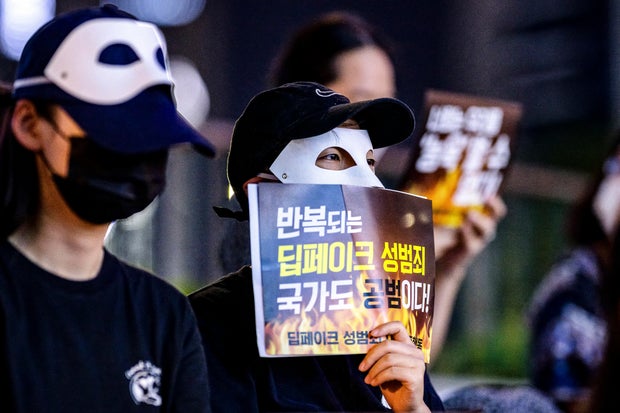South Korean lawmakers have passed legislation banning the possession and watching of sexually explicit deepfake images and video, according to the Reuters news agency. The new law was passed Thursday by South Korea’s National Assembly. It now lacks only a signature of approval by President Yoon Suk Yeol before it can be enacted.
Under the terms of the new bill, anyone who purchases, saves or watches such material could face up to three years in jail or be fined up to the equivalent of $22,600.
It is already illegal in South Korea to create sexually explicit deepfake material with the intention of distributing the content, with offenders facing a sentence of up to five years in prison or a fine of about $38,000 under the Sexual Violence Prevention and Victims Protection Act
ANTHONY WALLACE/AFP via Getty Images
If the new legislation is signed into law, the maximum sentence for the crime of creating deepfake pornography would be increased to seven years, regardless of whether the creator intended to distribute the images, according to Reuters.
There’s been public outrage in South Korea in recent years over the exchange of sexually explicit AI-manipulated images and deepfakes, and last month authorities launched an investigation into such content allegedly being shared via chat rooms on the Telegram messaging app.
An investigation by South Korean journalist Ko Narin for the country’s Hankyoreh newspaper, published in August, found that the faces of several female graduates of Seoul National University had appeared on sexually explicit deepfake materials produced and distributed by men with whom they’d studied.
“I was shocked at how systematic and organized the process was,” Ko told CBS News partner network BBC News earlier this month. “The most horrific thing I discovered was a group for underage pupils at one school [to share content] that had more than 2,000 members.”
The distribution of such imagery among young people in South Korea appears to be widespread problem. A total of 387 people have been arrested this year alone for crimes related to deepfake sexual content, with 80% of them teenagers, South Korea’s national Yonhap news agency reported this week, citing police data.
The investigation into Telegram was announced not long after the tech company’s CEO Pavel Durov was charged by French authorities with multiple crimes, including the allegation that his platform was used for the propagation of child sexual abuse material.
As CBS News reported, deepfake explicit images of pop icon Taylor Swift spread quickly on Elon Musk’s social media platform X early this year, drawing millions of views and prompting X (formerly Twitter) to temporarily block searches for the entertainer in January.
In May, two U.S. senators co-authored bipartisan draft legislation aimed at cracking down on non-consensual intimate deepfake images online. The legislation proposes penalties including fines and up to two years in prison, with civil penalties that could range up to $150,000.


